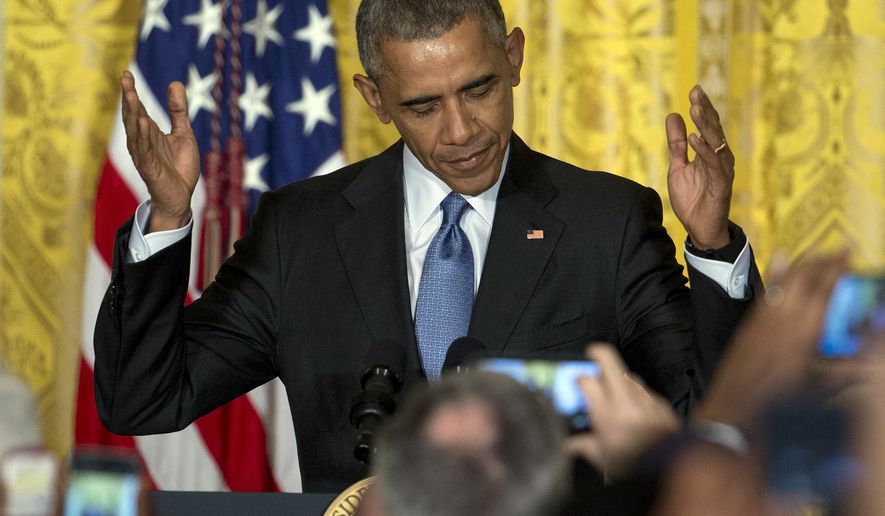Introducing a federal budget that Hillary Clinton is sure to love, President Obama submitted a $4.14 trillion spending plan to Congress on Tuesday that would keep deficits in check only by relying on speculative liberal assumptions of tax increases, immigration reform and economic growth.
Total federal spending would rise about 5 percent under Mr. Obama’s spending plan for fiscal 2017, which begins Oct. 1. Discretionary spending would increase less than 1 percent, with most of that rise in defense programs.
In his budget message to Congress, the president said his final spending plan “is about answering the big questions that will define America and the world in the 21st century.”
It includes big spending increases to address the effects of global warming, a $10-per-barrel fee on oil to pay for clean energy initiatives, tuition-free community college and a jump in cybersecurity programs.
Republicans, who agreed with the administration in October to increase spending by $30 billion in fiscal 2017, vowed to gut the president’s budget and replace it with their own priorities.
House Speaker Paul D. Ryan, Wisconsin Republican, called the president’s proposal “a progressive manual for growing the federal government at the expense of hardworking Americans.”
SEE ALSO: Obama’s $4 trillion budget fails laugh test in Congress
“President Obama will leave office having never proposed a budget that balances — ever,” Mr. Ryan said. “Americans deserve better. We need to tackle our fiscal problems before they tackle us.”
But the White House said Mr. Obama is still relevant and still has leverage to get most of what he wants from the Republican-majority Congress, as he did last fall.
Shaun Donovan, director of the White House Office of Management and Budget, said some conservative lawmakers want to “blow up” the agreement by cutting spending below levels outlined in the October deal.
“The question here isn’t a fight between the administration and Republicans,” Mr. Donovan said. “It’s a fight within the Republican Party.”
The Republican National Committee said the administration’s budget proposal “has Clinton’s fingerprints all over it,” including increased spending on renewable energy and job training programs to help those who lose their jobs in coal mining communities.
One of the president’s biggest election year gifts to Mrs. Clinton and Sen. Bernard Sanders of Vermont, who are battling for the Democratic presidential nomination, was the White House spin that Social Security is not facing a crisis.
Despite projections that the retirement program’s trust fund will exhaust its reserves in 2035, two of the president’s top advisers asserted Tuesday that the problem is not urgent.
“If you look at the long-run challenges we have on the fiscal side, Social Security is not a major contributor to that challenge,” Mr. Donovan said.
Jason Furman, the president’s top economic adviser, said keeping deficits on a sustainable path is more important than solvency of the Social Security program.
“From the very beginning of this administration, the president’s always said he was open to working together with Congress on a bipartisan basis to deal with Social Security,” Mr. Furman said. “But the most important thing is looking at the budget as a whole, and that’s where we’ve made substantial progress.”
Even as the White House downplayed Social Security’s troubles, Mr. Donovan was pushing comprehensive immigration reform in the budget. He said the addition of legalized workers who contribute payroll taxes would help save Social Security.
“One of the most important things that we can do is increase the number of workers that we have in this country and also raise their wages,” he said. “It’s one of the key things that immigration reform would do, is strengthen Social Security.”
Steve Bell, senior director of economic policy at the Bipartisan Policy Center, said Mr. Obama’s budget “signals another missed opportunity to fundamentally change the direction of federal deficits and soaring federal debt,” but he added that Congress is equally to blame.
“Neither wants to reform Medicare, Medicaid, Social Security and other entitlements,” he said.
Mr. Obama’s budget envisions annual deficits declining slightly in fiscal 2017 and 2018 before rising steadily to $793 billion in 2026. Senior administration officials said deficits would remain below 3 percent of gross domestic product throughout the 10-year budget cycle if Mr. Obama’s policies are fully enacted.
But the spending plan relies on some wildly optimistic assumptions, including the addition of $955 billion in revenue over 10 years by ending tax breaks for wealthier households.
The administration also is counting on Congress to approve comprehensive immigration reform next year. It said reform would save the government $1 trillion over the next 20 years by adding workers to boost payroll contributions to entitlement programs. Conservatives in Congress, and most Republican presidential candidates, vow that immigration reform won’t pass until the nation’s borders are secure.
The administration projects economic growth of 2.5 percent per year. Growth in GDP slowed to 0.7 percent in the fourth quarter last year, according to projections.
The administration’s estimate of growth is based in part on congressional approval of the free trade Trans-Pacific Partnership, which Mrs. Clinton and nearly all Democratic lawmakers oppose.
Several proposals in Mr. Obama’s budget could find a receptive audience in Congress, including an additional $19 billion in spending on cybersecurity, $1.1 billion to address heroin addiction, $750 million for a “moon shot” program to cure cancer, expansion of tax credits for low-income families and a doubling of counterterrorism funding to combat the Islamic State terrorist group.
• Dave Boyer can be reached at dboyer@washingtontimes.com.




Please read our comment policy before commenting.